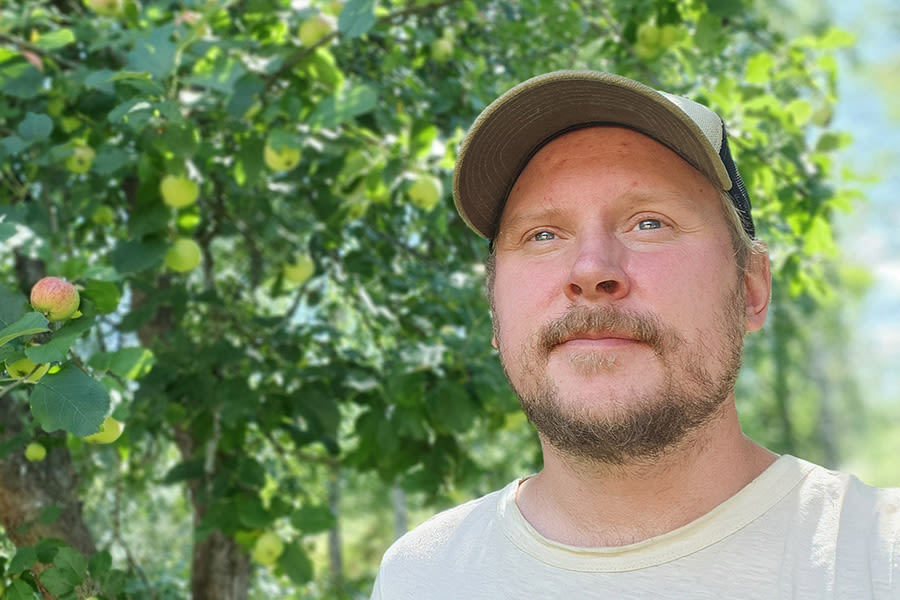When did you start your career as an Elisian, and in what roles? How did you end up at Elisa?
I started at Elisa at the beginning of 2023 as a Cyber Security Analyst at the Elisa Cyber Security Centre. I'm a career changer: I worked in the restaurant industry for a long time, doing all kinds of restaurant work, from dishwasher to restaurant manager. I started studying for a vocational qualification in ICT, and I applied for a job at Elisa for the first time in spring 2022, when I was just about to finish my studies. I wasn’t selected at the time, but the team manager called me after the recruitment process was finished. He talked for some time about why I hadn’t been chosen, and he told me that my application was interesting and asked me to apply again the next time a similar position was open.
At the end of 2022, I applied again and got the job. At the same time, I had just agreed to work for another company selling cybersecurity services. It was effort that the manager from Elisa had taken to call me, alongside the atmosphere in the job interviews, that convinced me that I wanted to become an Elisian, and here we are!
I have been working as an Experienced Cyber Security Analyst in the 24/7 team since the start of 2024, which means that I work in shifts around the clock. I ended up applying for the position because of the varied nature of the job description it offered – for example, the role includes tasks related to team development and investigating more significant deviations and incidents.
What's the best thing about your job and what does it involve?
There are challenges both big and small, and the solutions are genuinely significant for the safety of customers’ digital operating environments.
I also can't praise my colleagues and the entire staff of Elisa's Cyber Security Operations Centre enough: it’s a privilege to work together and learn from them. They have such solid expertise.
My work covers pretty much the whole spectrum of cyber: a wide range of activities, ranging from highly technical and demanding investigations to various tasks related to developing team and unit operations. This keeps my days varied and interesting.
In my work, I assist cyber analysts and other teams in investigating more significant information security incidents. I also spend a lot of time in tasks related to developing the team's operations, sparring with individual cyber analysts about a lot of different things: the technologies we use, ways to investigate various information security incidents, or even how to examine a potentially harmful PDF email attachment, including what to look for and how.
I am also responsible for inducting trainees and cyber analysts who have started with us, and I hold a regular case-study workshop for them. In the remaining time, I participate in various ways, for example, in developing and rolling out various kinds of automation. Plus, I spend time on stakeholder activities, like taking part in weekly meetings with Elisa customers or cyber development work with other Elisa business units.
You've just received the title of Cyberforce Sentry from Palo Alto Networks. Tell us how you achieved that rare title – what kind of journey was it?
Actually, the recognition came as a bit of a by-product of a long and determined journey to better understand the technology I’m using so I can be better at my job. When I started at Elisa in 2023, Palo Alto products were mostly unknown to me. During my induction, I noted that I needed to get to know these platforms and technologies a little better. So, I started actively training and getting certified through Palo Alto's partner portal. I actively utilised what I learned in my daily work and brought the lessons to the attention of the team more broadly. Gradually, the basics became easy.
This created a somewhat self-perpetuating virtuous cycle: when I or a colleague encountered a situation or problem that I did not know how to answer, I looked for a solution in Palo Alto's partner portal, for example, through courses and discussions. Gradually, my skills grew, and I began to actively participate in various Palo Alto training courses, some of which were held in other time zones. This required flexibility, as course days could start at three o'clock in the morning, for example.
On the sidelines of all this, I had to wade through the certification material and complete the Palo Alto Certified Professional Cortex and Palo Alto Certified Professional Strata certifications, as well as a dozen Associate certifications for various Palo Alto technologies, and PCDRA and PCSAE certifications related to the Cortex product family.
What has developing your own skills meant to you, and what have you done to achieve it?
Continuously developing your own skills gives you a number of direct and indirect benefits that directly affect factors that have been shown to be important, such as the sense of meaningfulness and the feeling of success, which directly lead to coping at work, enjoyment and job satisfaction. It's rewarding to realise that now you can understand something that was previously a mystery or difficult. In my opinion, Elisa enables personal development very well. Nobody does it for you, but there’s plenty of encouragement and support.
I consciously try to learn something new every day: a little more of what I already know or something completely new. This way, there will be a lot of small successes during the day, and learning will not feel like a chore.

